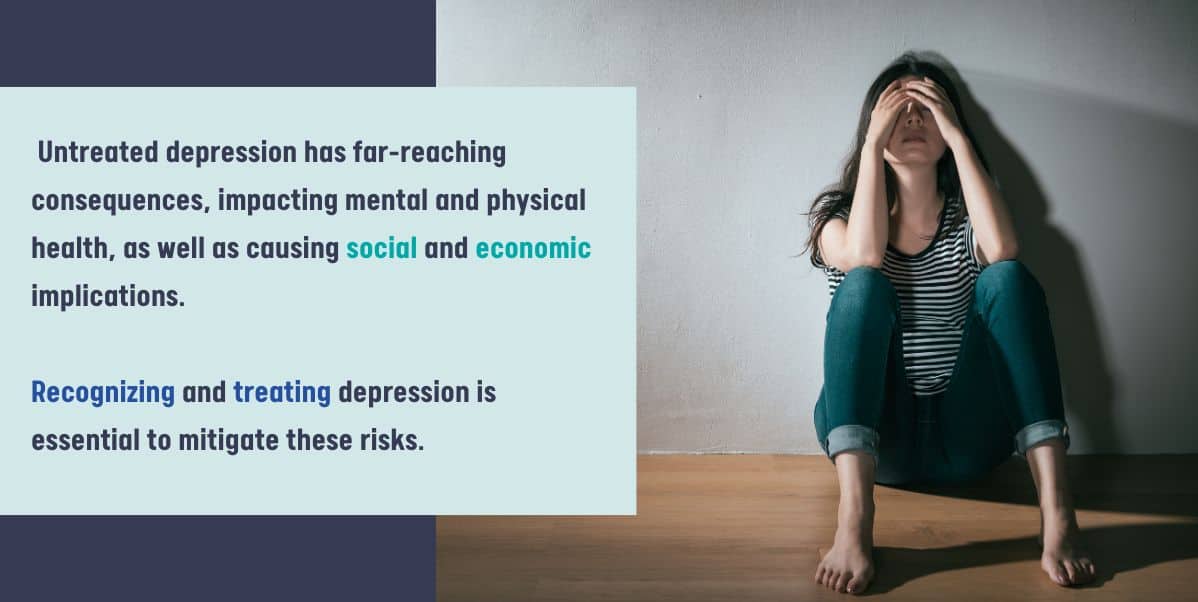
In a time where mental health is gaining more recognition and understanding, it’s essential to dive deeper into conditions such as depression. The question, “Does Depression Go Away Without Treatment?” echoes in the minds of many.
This blog aims to explore this question from a scientific and psychological perspective. We will dissect the nature of depression, its symptoms, duration, and severity, and examine whether this mental health condition can resolve on its own without any form of intervention.
Our goal is to provide you with comprehensive insights, backed by research and expert opinion, to understand better the complexities of managing depression.
Understanding Depression
Depression, also known as major depressive disorder, is a prevalent and serious medical condition that drastically impacts an individual’s feelings, thoughts, and actions. It is characterized by a persistent feeling of sadness, and a lack of interest in activities once enjoyed. It can also cause emotional and physical problems.
Symptoms of depression manifest in many ways, but the common ones include anxiety, irritability, difficulty concentrating, persistent sadness, feelings of hopelessness, decreased energy, changes in appetite and sleep patterns, and thoughts of death or suicide.
According to the American Psychiatric Association, depression is a global health concern, affecting more than 264 million people worldwide. It significantly impairs an individual’s ability to function at work or school and to cope with daily life. At its worst, depressive disorder can lead to suicide. Therefore, understanding depression is crucial for early detection, treatment, and improving the quality of life for those affected.
Can Depression Go Away on Its Own?
The Natural course of depression can vary greatly among individuals. Some may experience episodes that last a few weeks or months, while others may grapple with depression for years.
While depression can sometimes resolve on its own, it’s not the norm. Most cases of major depressive disorder (MDD) do not go away without treatment like therapy or medication. The probability of spontaneous remission, however, appears to be higher in cases of mild depression.
One study found that 23% of people with untreated depression experienced remission within three months. However, even those who initially improved were still likely to have a relapse in the following years. Another study in the Archives of General Psychiatry found that 15% of patients with untreated MDD experienced remission within a year.
Hence, it’s crucial to seek professional help when dealing with depression. Timely and appropriate treatment can significantly reduce the duration and severity of depressive episodes.
Risks of Untreated Depression
Untreated depression has far-reaching consequences, impacting mental and physical health, as well as causing social and economic implications. Recognizing and treating depression is essential to mitigate these risks.

Mental Health Risks
Mental health risks are substantial when depression goes untreated. Symptoms of clinical depression can last for two weeks or more, affecting all aspects of life.
Untreated depression can lead to other mental problems, including anxiety disorders. This happens because hormones that regulate mood and emotions may not function correctly in a person suffering from depressive disorders.
Physical Health Risks
Physically, untreated depression can be detrimental to health. It can lead to illness and has been associated with various health concerns. Appropriate treatment is necessary for pregnant women as maternal depression can harm both mother and child.
Social and Economic Implications
Untreated depression also has social and economic implications. It can quickly unravel relationships, robbing individuals of their social life. Economically, it can affect work life, leading to job loss or decreased productivity. Moreover, untreated depression could lead to substance abuse, which has further economic implications.
Current Treatment Modalities for Depression
Depression is a complex mental health disorder requiring a multifaceted treatment approach. This typically involves psychotherapy, medication, lifestyle changes, and in some cases, advanced treatments like Transcranial Magnetic Stimulation (TMS).
Psychotherapy: It plays a fundamental role in managing depression. Cognitive Behavioral Therapy (CBT) aims to change negative thought patterns, helping individuals challenge their distortions and view their surroundings in a more realistic light. Interpersonal Therapy (IPT), on the other hand, focuses on improving personal relationships that might contribute to depressive symptoms.
Transcranial Magnetic Stimulation (TMS): TMS is a noninvasive procedure that uses magnetic fields to stimulate nerve cells in the brain, improving symptoms of depression. It’s particularly beneficial for those who haven’t responded adequately to standard treatments.
Medication: Antidepressants and mood stabilizers are often prescribed to manage depression. Antidepressants work by correcting imbalances of brain chemicals that affect mood and emotions. Mood stabilizers can help prevent ups and downs, particularly beneficial in treating bipolar depression.
Lifestyle changes: Changing your lifestyle can significantly enhance the effectiveness of clinical treatments. Regular exercise releases endorphins, promoting feelings of happiness. A balanced diet ensures the body gets the necessary nutrients to function correctly, and maintaining good sleep hygiene can significantly impact mood and energy levels.
The Importance of Seeking Help
Professional assistance is critical in managing depression, improving the prognosis and enhancing the quality of life. Psychotherapy, often delivered by psychologists, equips patients with strategies to cope with stress and manage depression symptoms effectively.
Self-management education programs are another valuable tool for people with depression, granting them control over their symptoms. Collaborative care interventions, which utilize case managers to link primary care providers, patients, and mental health specialists, can also be highly effective.
A strong support system has been proven to reduce depression and anxiety, highlighting the importance of social connections in the treatment process. Depression treatment specialists can also play a role in encouraging patients to seek help and educating them about managing depression.
Seeking professional help is essential in overcoming depression, with various professionals contributing to comprehensive, patient-centered care.
Get Started On Your Recovery Journey Today
If you or a loved one are grappling with depression, it’s time to take the first step toward recovery. My TMS specializes in Transcranial Magnetic Stimulation (TMS), an FDA-approved, non-invasive treatment designed to help manage depression. Don’t let depression control your life any longer. Call us today at (877) 548-8081 or book an appointment with our professional team. Your journey to recovery begins with a single step. Let’s conquer depression together.


